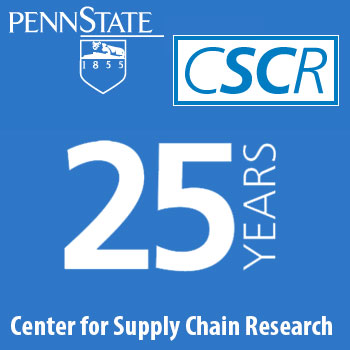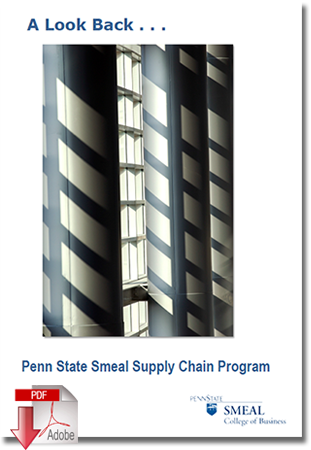Collaboration with Industry Shapes 25 Years of Center for Supply Chain Research

Corporate Sponsors help focus Center for Supply Chain Research efforts in ways that best help accomplish its mission as a bridge between academia and industry.
The Penn State Smeal College of Business Center for Supply Chain Research (CSCR) celebrated its 25th anniversary at its spring 2014 Corporate Sponsor meeting, held at the end of April at the Penn Stater Hotel and Conference Center.
The Corporate Sponsorship Program aims to create comprehensive research and education partnerships between the University and industry-leading firms with the center as the integral link.
Corporate Sponsor meetings, held twice annually at Penn State’s University Park campus, exemplify the CSCR’s close connection with industry. They offer faculty and corporate representatives an opportunity to discuss the industry’s most current issues and find points of collaboration to address pressing challenges.
One of the primary topics of discussion was the fall 2014 Supply Chain Leaders Forum, an invitation-only program that facilitates peer-to-peer discussions among supply chain executives around current supply chain management issues. This forum, slated for early September, will focus on supply chain visibility and alignment.
The center also sought input on its strategic plan. The University — including all its colleges and various administrative units — is currently undergoing this extensive planning process to identify goals, initiatives and points of focus for the next five years.
“It has always been incredibly important that we stay on the forefront of what’s happening in industry,” said William “Skip” Grenoble, the center’s executive director. “Our Corporate Sponsors help us focus our efforts in ways that will best help us accomplish our mission as a bridge between academia and industry.”
Going Forward . . .
Emerging Issues in Supply Chain Management
“Environmental initiatives have impacted every aspect of supply chain, including the extractive industries—iron ore, coal, nonferrous metals, and tar sands oil. Some of the big issues are air and water quality, safety regulations, and security measures for companies doing international business—both at plants and in containers shipping goods. Today, when building fixed facilities, you have to ask yourself: ‘How energy-efficient are they?’ and ‘How does the use of coal as fuel affect facility production?’”
John Spychalski, Professor Emeritus of Supply Chain Management, Supply Chain and Information Systems
In the wake of mounting regulatory pressures for sustainable business practices, industry executives are becoming increasingly aware of the need to include “green supply chains” in their strategic thinking. As more consumers ask questions about how green a company’s supply chain processes are, from sourcing to manufacturing to delivery to recycling, the challenge for business executives is how to achieve financial gains while improving environmental performance. Companies are evaluating potential improvements to operations all along the supply chain, such as establishing reusable container programs with suppliers, and adopting practices that reduce waste-disposal costs. They are also identifying the “ready-made” savings, such as those associated with fewer environmental-permitting fees.
“The Internet effect” is another big contemporary issue in the field of supply chain, including e-tailing and direct home delivery, online discount couponing on inventory, customer facing (communicating with existing and potential customers through social media), and on-demand learning. Other issues relating to use of technology are enhanced tracking and monitoring through point-of-sale data, product delivery, and internet purchases.
This is where “big data” comes in. Quantities of good information can help with identifying purchasing trends, reducing inventory, and ensuring timely delivery of products and services—but only when acquired, managed, and interpreted with the aid of sophisticated information technology, expert IT support, and business analysts who can bridge the sometimes daunting gap between the helpdesk and the
boardroom.
A prominent emergent issue in supply chain management is risk management as it relates to natural disasters around the globe, round-the-clock cyber security, business-to-business counterfeiting, and political factors including government stability in other nations. Also coming to the attention of business executives is the potential effects of 3-D production technology on operations and profits.
The demand for supply chain professionals has remained high even in recent times of high unemployment rates and slow economic recovery. In 2012, the U.S. Government announced a National Strategy for Global Supply Chain Security, and in the first quarter of that year, nearly 50,000 supply chain jobs were posted online by organizations in both the public and private sectors (though not all of the postings included the word supply chain).
The challenges associated with these current and emerging issues are many. But so are the opportunities. There is still much to be done in the growing green arena, within the vast reaches of information technology, and in the expanding domain of risk management, and businesses are clamoring for supply-chain professionals to step in and innovate.
The close connection between faculty in the CSCR and top executives in the supply chain industry is critical to the research center’s mission, Grenoble says, and CSCR Director of Research Christopher W. Craighead agrees.
“There are two primary purposes for research: one is to advance the academic conversation by building new knowledge, and the other is to disseminate this new knowledge for improvement of industry,” said Craighead, Rothkopf Professor of Supply Chain Management. “We do both of these better when we have extensive engagement with corporate representatives.”
The benefits, however, don’t stop with research. Corporate Sponsors also have a unique opportunity to impact student supply chain curriculum by providing feedback on the preparation that they see in the students they hire for internships and full-time positions.
“Industry input helps keep us on the cutting edge of providing world class supply chain education,” said Robert Novack, associate professor of business logistics. “Because we have such a close connection with many of the most active hiring firms of our students, we’re really able to keep our ear to the ground as to what our students do well and what curricular adjustments may be required in the future, based on changes in the industry.”
Attendees of the anniversary celebration dinner, held the evening before the daylong Corporate Sponsor meeting, had the unique opportunity to hear from the center’s founder, John Coyle; current executive director Grenoble; and the incoming executive director, Steve Tracey, who will take the helm later this summer as Grenoble retires.
“So much has changed in the industry since the beginning of the center 25 years ago,” said Grenoble. “It’s been a privilege to work with the center from the beginning, first under John Coyle [professor emeritus of business administration and director of corporate sponsors for CSCR] and later as executive director.”
Tracey added, “It’s truly an honor to follow in the footsteps of two individuals who are so accomplished in their profession and to be a part of such a robust logistics and supply chain tradition. I’m really looking forward to joining the supply chain team at Penn State.”
About the Center for Supply Chain Research
The Center for Supply Chain Research is one of the nation’s leading institutions dedicated to research and education in the supply chain field. The center’s mission is to be a leading source of supply chain knowledge creation and dissemination. Working in conjunction with faculty members from various academic areas, the center conducts research in areas such as distribution, warehousing, transportation, procurement and supply, customer service, systems modeling and design, logistics information systems, global logistics, and more. Learn more at Center for Supply Chain Research.
Related: Supply Chain Executive Educational Institutions & Professional Associations
Article Topics
Penn State Smeal College of Business News & Resources
Supply Chain Education in the Post-COVID World Differences between the COVID-19 Pandemic and Other Supply Chain Disruptions 2019 Third-Party Logistics Study: The State of Logistics Outsourcing The 21st Annual, 2017 Third-Party Logistics Study Armstrong & Associates 2017 Top 50 U.S. and Global Third-Party Logistics Providers A Wide-Ranging Look at the Role of Third-Party Logistics in Different Supply Chain Areas 2016 Third-Party Logistics Study More Penn State Smeal College of BusinessLatest in Supply Chain
Ranking the World’s 10 Biggest Supply Chains The Top 10 Risks Facing Supply Chain Professionals Walmart’s Latest Service: Ultra Late-Night Delivery Dollar Tree’s Oklahoma Distribution Center Decimated by Tornado The Era of Self-Driving Tractor-Trailers Set to Begin Is the Trailers as a Service (TaaS) Model Right For Your Business? Why Grocery Shoppers are Leaving Stores to Buy Their Food Online More Supply Chain













